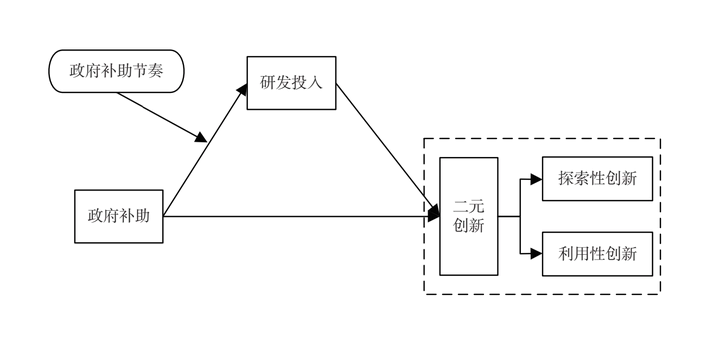 Image credit: JSJJ
Image credit: JSJJStep by Step or Overnight? Research on the Impact of the Rhythm of Government Subsidies on Ambidextrous Innovation of Firms [in Chinese]
Abstract: As the main force of innovation, the scarcity of original achievements in firms has become a bottleneck that restricts the development of China’s innovation‐driven growth. The conventional static perspective ignores the dynamic characteristics of thd rhythm of government subsidies,leading to significant biases in evaluating government subsidies standardization’s impact on firms’ ambidextrous innovation (exploitative and exploratory). Based on a dynamic perspective of the rhythm of government subsidies,using panel data from 2002 listed companies on the A‐share market in China from 2011 to 2017 to explore the impacts of government subsidies on ambidextrous innovation in firms, the potential moderating effect of the rhythm of government subsidies,and the theoretical mechanism of R&D investment in firms. The results show that government subsidies can significantly strengthen the ambidextrous innovation in firms, and are more conducive to promoting disruptive exploratory innovation. The increasement of R&D investment in firms is an important mechanism for government subsidies to promote ambidextrous innovation in firms and is negatively moderated by the rhythm of government subsidies. It provides theoretical support and practical evidence for the central and local governments to pay attention to the rhythm of government subsidies, promote the reasonable and effective use of government subsidies exclusive account funds by firms,and ultimately accelerate the achievement of innovation‐driven development strategic goals.
作为创新的主体,企业原创性成果稀缺已成为中国实现创新驱动发展的桎梏。传统静态视角研究忽视了政府补助投入的动态特征,导致在评估政府补助规则化程度对企业二元创新(利用性和探索性)的影响时存在明显偏误。基于政府补助节 奏的动态视角,本文利用2011—2017年中国A股2002家上市公司的面板数据,深入探讨了政府补助对企业二元创新的影响效 应、政府补助节奏潜在的调节作用及企业研发投入所扮演的重要作用机制。结果表明:政府补助对企业二元创新均具有显著的正向影响,且对颠覆式的探索性创新促进作用更加明显;企业研发投入增加是政府补助促进企业二元创新的重要影响路径,并受到政府补助节奏的负向调节作用。本文可为中央和地方政府重视补助发放节奏,促进企业对政府补助专有账户资金合理有效使用,最终加快创新驱动发展战略目标实现等提供理论支撑与现实佐证。
基金项目
国家社会科学基金重大项目“创新链与产业链耦合的关键核心技术实现机理与突破路径研究”(22&ZD094)
国家自然科学基金面上项目“企业二元创新战略下资源配置与开放获取整合机制研究”(72072167)
作者简介
刘志迎,博士,中国科学技术大学管理学院(国金院)教授,博士研究生导师,省级重点研究基地工商管理创新研究中心主任,研究方向:创新管理、产业技术创新、区域创新;
叶雨杭,中国科学技术大学管理学院硕士研究生,研究方向:创新管理;
郑维伟(通讯作者),上海交通大学安泰经济与管理学院博士研究生,研究方向:区域经济与空间计量理论建模与应用。